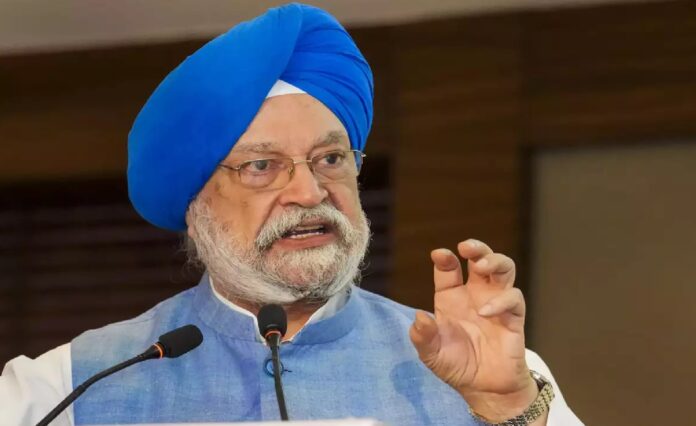India’s Petroleum Minister Hardeep Singh Puri Reassures Stable Oil Supply Amid Global Price Fluctuations and Geopolitical Tensions
On October 22, Hardeep Singh Puri, India’s Minister for Petroleum and Natural Gas, addressed the recent rise in global crude oil prices, providing reassurance that despite current fluctuations, there is no shortage of oil worldwide. Puri expressed optimism that prices would eventually decline, attributing the current spike to geopolitical tensions and voluntary cuts in oil production by some nations. His statements offer insight into the factors driving oil prices and India’s preparedness to meet its growing energy needs.
Speaking to the media, as reported by ANI, Puri emphasized that the oil market is sufficiently supplied and that global tensions, particularly in the Middle East, are primarily responsible for the price hike. “It depends on global factors,” he said. “One thing is very clear, there is no shortage of oil in the world… Today, more and more oil is coming on the market.” His remarks suggest that while oil supply remains robust, other external influences—such as geopolitical conflicts and voluntary production cuts—are impacting transportation and insurance costs, which in turn affect global oil prices.
Puri further elaborated on the role of geopolitical tensions in influencing oil costs, noting that these tensions can lead to increased freight and insurance expenses. “If there’s tension in one part of the world, then the freight cost, and insurance freight cost will go up,” he explained. The ongoing conflict in the Middle East, for example, has prompted concerns over the security of shipping routes, causing companies to take longer, safer routes, which subsequently raises transportation costs. Despite these challenges, Puri remains optimistic, adding, “There is more than enough oil in the world, and prices should hopefully come down.”
The Union Minister also pointed to other global factors affecting the oil market, including efforts by countries like Brazil and Guyana to ramp up production. These nations are increasing their oil output, which could help stabilize the global supply and, ultimately, oil prices. Puri mentioned that while geopolitical factors are difficult to control, India has maintained stable oil prices over the past three years through strategic interventions by the government.
The Indian government has actively worked to mitigate the impact of rising oil prices on domestic consumers. From November 2021 to May 2022, the central government intervened to lower prices and cushion the public from the full brunt of international market fluctuations. Puri acknowledged that the government continues to do everything possible to keep prices in check, stating, “The central government at every stage has stepped in to cushion and bring the prices down.” However, he noted that oil prices at the retail level are determined by several factors beyond just the cost of the barrel. These include transportation, freight, insurance, refining costs, dealer margins, and more.
The Minister stressed that while India is doing everything within its control to stabilize prices, much depends on the actions of the global community. He called for international cooperation to address the factors driving oil prices higher and expressed hope for a resolution to geopolitical tensions. “Let us all hope that better sense prevails, that the call for peace that our Prime Minister has been making from every forum is heeded,” Puri said.
India, the world’s third-largest oil importer, is highly sensitive to fluctuations in global oil prices, which have a direct impact on inflation and the economy. The government has been actively diversifying its energy sources to enhance security and reduce reliance on any single region or supplier. Puri highlighted that India has expanded its base of oil suppliers from 27 to 39 in recent years, a strategic move aimed at mitigating supply disruptions and ensuring a steady flow of energy resources. This diversification is a key component of India’s energy security strategy as it seeks to meet its growing demand for oil.
The Minister’s comments came just days after a nearly 2% surge in oil prices on October 21, when Brent crude futures rose by $1.44, or 1.97%, recovering from the previous week’s sell-off. The rise in prices was driven by a combination of factors, including voluntary production cuts by major oil-producing nations and heightened tensions in the Middle East. These developments have created volatility in the oil market, leading to price swings that are being closely monitored by policymakers and industry experts alike.
Earlier this month, Puri reiterated that India is well-prepared to meet its growing energy demands, highlighting the country’s proactive measures to secure diverse and reliable sources of oil. He emphasized that India’s expanded procurement base strengthens its ability to navigate the complexities of the global oil market and ensures that the country remains resilient in the face of supply disruptions or price fluctuations.
In conclusion, while the recent rise in oil prices has caused concern, Hardeep Singh Puri’s statements suggest that India is well-equipped to handle these challenges. The global oil market remains adequately supplied, and the government is taking all necessary steps to stabilize prices and ensure energy security. However, much will depend on how geopolitical tensions evolve and whether the global community can come together to address the underlying issues affecting oil prices. With strategic planning and diversification of oil sources, India appears prepared to weather the current fluctuations in the global energy landscape.

